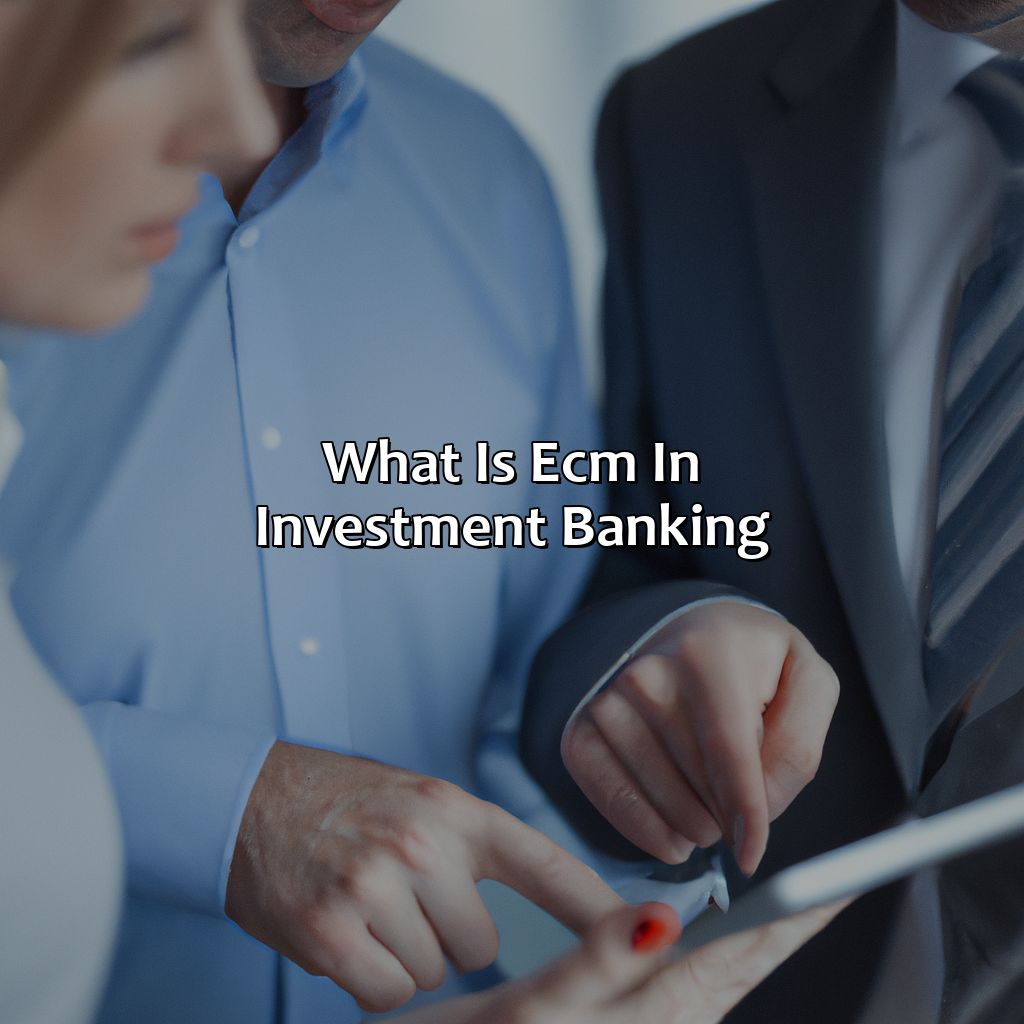What Is Ecm In Investment Banking?
Key Takeaway:
- ECM in investment banking refers to the services provided by firms to assist companies in raising capital through equity and debt markets, as well as M&A activities.
- ECM offers a range of services, including equity capital markets, debt capital markets, and mergers and acquisitions, to help companies achieve their capital-raising goals.
- The importance of ECM lies in its ability to provide companies with access to capital and investors with opportunities for profitable investments. ECM also helps companies navigate the complex regulatory landscape and make optimal financial decisions.
- ECM differs from DCM in that DCM focuses solely on debt-based financing, whereas ECM covers a wider range of financing options and services.
Are you looking to break into investment banking but have no idea what ECM stands for? Learn why ECM is essential for successful investment banking and how it can help you take your career to the next level.
Definition of ECM in Investment Banking
ECM or Equity Capital Markets is a division of investment banking that deals with equity financing for companies. The ECM division facilitates the process of issuing and selling new shares of stock to raise capital. This process often involves an investment bank acting as an intermediary between the company and the investors. The ECM team also helps companies to prepare their financial statements, prospectuses, and other legal documents necessary for them to go public or raise equity capital.
In addition to underwriting and selling equity securities, the ECM team also provides strategic advice to clients on matters related to equity capital markets. They help clients to navigate the regulatory landscape, assess their fundraising needs, and identify potential investors for their securities. The ECM team also helps clients to evaluate the risks and benefits of various fundraising options, such as IPOs, secondary offerings, and private placements.
ECM is a critical function of investment banking, playing a vital role in capital formation and market efficiency. In recent years, the ECM market has been growing rapidly, as more and more companies look to go public or raise capital through equity financing. However, the process of raising equity capital can be complex and challenging, requiring careful planning and execution. The success of an ECM deal depends on many factors, including market conditions, investor demand, and the quality of the issuer’s financial statements and other legal documents.
In a recent ECM deal, a leading technology company raised $1 billion in an IPO, exceeding its original fundraising target. The deal was oversubscribed, with strong demand from institutional investors. The ECM team worked closely with the company’s management to prepare the IPO prospectus and roadshow presentation, and to identify potential investors. The successful execution of the deal helped to establish the company as a major player in its industry and positioned it for future growth.
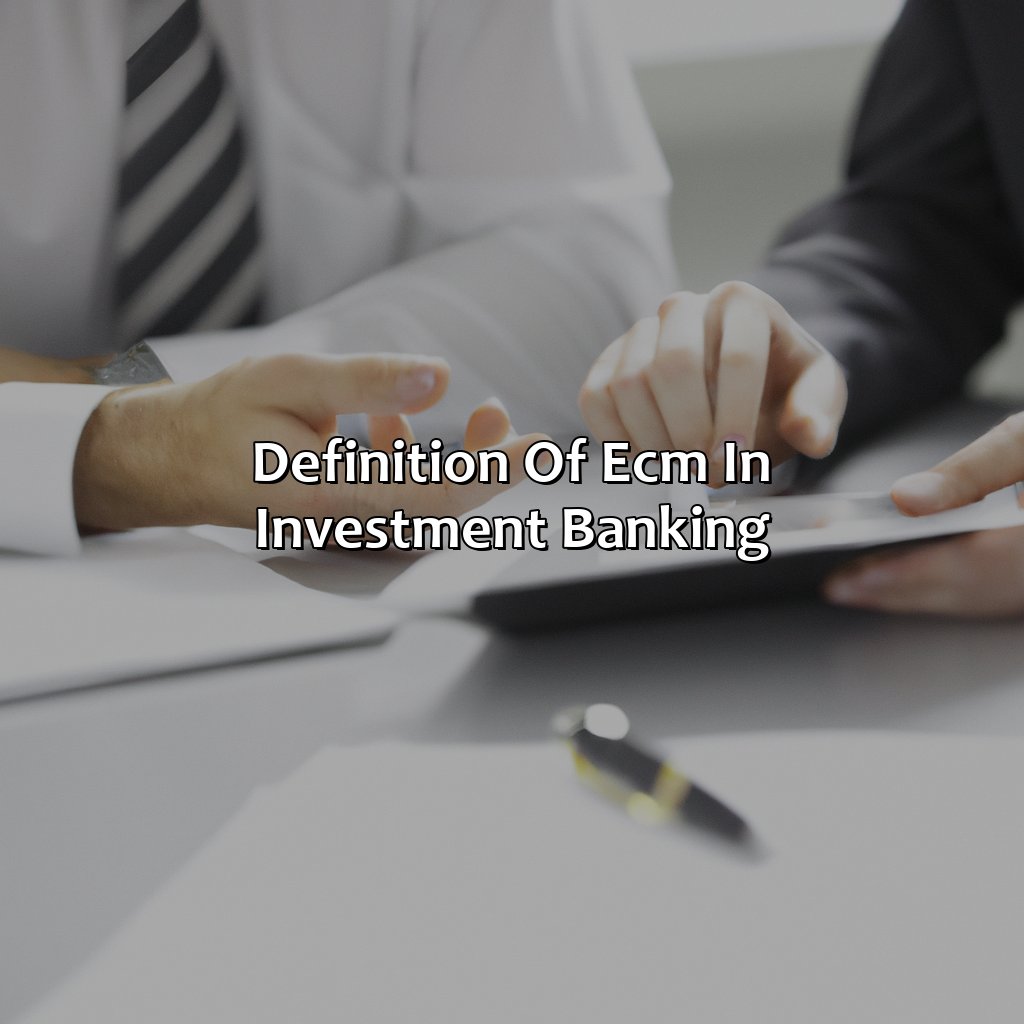
Image credits: retiregenz.com by David Washington
Services offered by ECM in Investment Banking
Investment banking partnerships can be beneficial – but to reap the rewards you need to know about ECM. This stands for Equity Capital Markets. However, there’s more than equity out there – Debt Capital Markets and Mergers & Acquisitions too! Let’s take a quick look at each of these, to understand the advantages they bring.
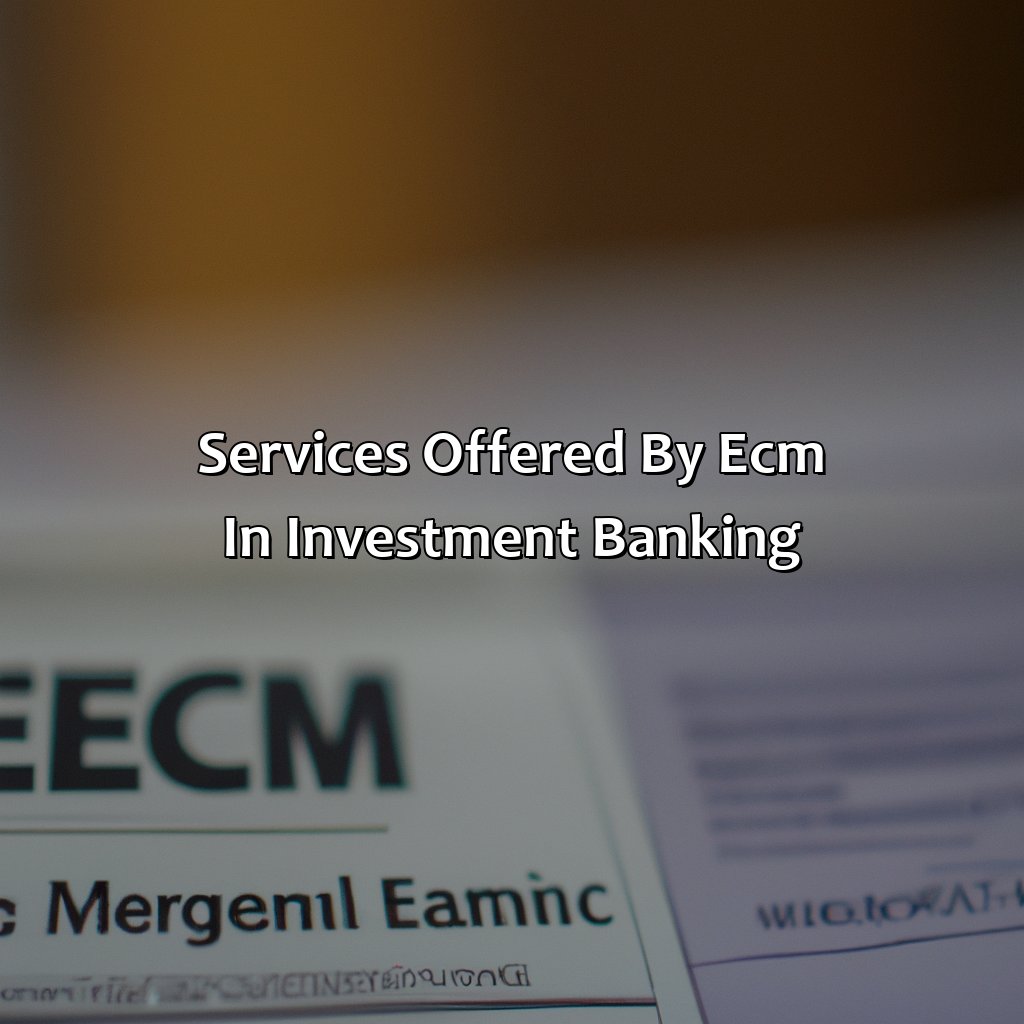
Image credits: retiregenz.com by Joel Woodhock
Equity Capital Markets
The domain of investment banking offers various services to aid investors in managing assets effectively. One such service is the facilitation of Equity Capital Markets or ECM. The role of ECM is to help companies raise capital by issuing shares and other financial instruments on stock exchanges.
The strategic significance of Equity Capital Markets cannot be overstated in the investment banking arena. It enables companies to make initial public offerings, secondary offerings, rights issues and bond issuances through underwriters, who are responsible for ensuring that the securities reach the target audience. Moreover, it provides a robust platform for generating funding, improving liquidity and reducing costs.
Equity Capital Markets operates through a well-defined process that involves analyzing market trends, designing offering structures and marketing securities to potential buyers. Besides traditional equity products like common stocks and preferred stocks, ECM also deals with hybrid securities like convertible bonds and exchange-traded funds. Furthermore, it collaborates with trading desks to ensure efficient pricing throughout the duration of IPOs.
A recent instance where ECM played a vital role was TransDigm’s scandalous purchase of aerospace parts sellers. Apparently, this Cleveland-based co-founder made excessive profits selling airplane parts that cost fractions of their price by engaging many potential buyers at once during an e-bay style competitive bidding process conducted by an outside firm hired by TransDigm: Ari Altstedter reports for Bloomberg.
Debt capital markets are like a game of Jenga – stacking up risky investments until someone pulls the wrong one and the whole thing comes crashing down.
Debt Capital Markets
The bond market is a vital part of the finance industry, enabling businesses and governments to access funds to fuel their growth. Bond financing could mean that an issuer needs to borrow capital for investment purposes and returns it at the end of the term with interest payments made regularly. Debt Capital Markets (DCM) refer to financial activities associated with debt securities issuance requiring extensive resources such as bonds – corporate or municipal bonds, collateralized debt obligations (CDO), or mortgage-backed securities (MBS). Capital markets like loans help build bonds’ worth, providing investors with stable income streams derived from fixed coupon rates instead of relying on stock price fluctuation.
DCMs provide investment banks with a dependable revenue stream and allow them to leverage capital more efficiently by raising and investing funds in their transactions. DCM offerings may include:
- bond origination, which enables issuers to bring new debt securities into the market;
- underwriting services;
- primary dealer agreements managing syndicated loans and participating in auctions when issued Treasury bonds auctioned by central bank authorities;
- credit rating services suitable for assessing risk levels;
- liquidity provision encompassing secondary-market trading activities supporting short-term cash management requirements or portfolio rebalancing within pension funds or mutual funds.
Famous DCMs located mainly in Europe cover multiple bond asset classes, including:
- corporate bonds;
- high-yield bonds frequently referred to as “junk” bonds originating from firms recovering from bankruptcy or below-investment-grade rating levels;
- mortgage-backed securities like residential MBSs/collateralized mortgage obligations (CMO), commercial mortgage-backed securities (CMBS);
- government agency securities such as Fannie Mae/Freddie Mac agencies that guarantee underlying mortgages’ principal balance.
When it comes to mergers and acquisitions, it’s like a game of chess except the pieces are companies and the stakes are millions of dollars. No pressure.
Mergers and Acquisitions
As part of the ECM services in investment banking, companies may seek assistance with ‘corporate transactions.’ This could include mergers and acquisitions, divestitures, joint ventures, and spin-offs. Investment banks offer valuable expertise and guidance throughout the transaction process, including due diligence assessments, project management, and negotiation support. These services are critical to maintaining healthy corporate transitions that benefit all parties involved.
In mergers and acquisitions specifically, ECM teams play a crucial role in conducting financial analysis to help determine the value of the target company and creating presentations for potential buyers or sellers. They also work closely with legal teams to ensure all necessary compliance measures are taken during the deal-making process. The ECM team may also identify potential merger or acquisition targets for clients based on their specific market objectives.
It’s worth noting that every merger or acquisition is unique in the considerations that must be taken; this includes regulatory concerns or potential cultural misalignments. Therefore it’s essential to have dedicated professionals advising stakeholders throughout the entire execution process.
Pro Tip: Mergers and Acquisitions require careful planning from beginning to end – be sure to communicate openly with your assigned ECM team!
ECM is to Investment Banking what a good wingman is to a night out – essential for success and always there to back you up.
Importance of ECM in Investment Banking
Gaining knowledge of ECM’s importance in investment banking is critical. It provides advantages to both companies and investors. Companies can access capital, whilst investors gain access to different investment choices. This section will give an overview of the benefits ECM offers to companies and investors, without going into detail about each one.
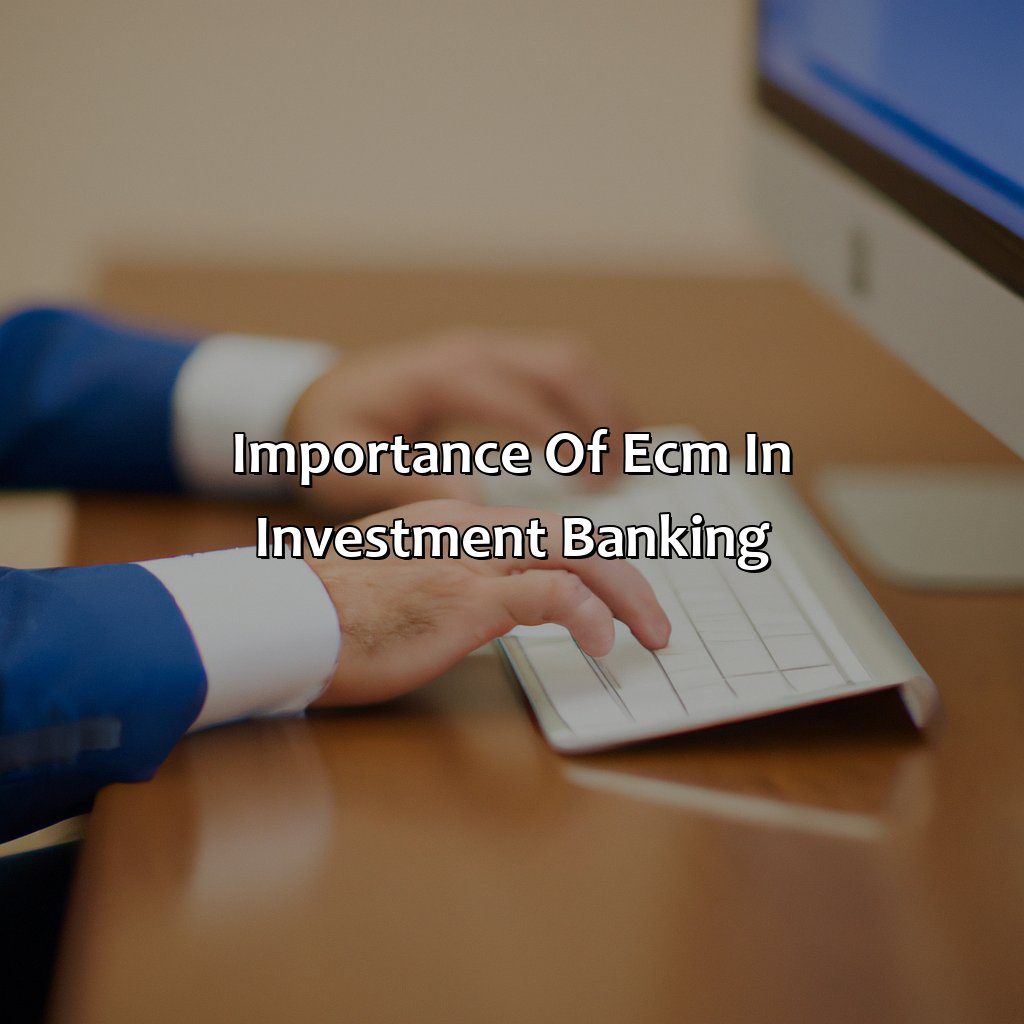
Image credits: retiregenz.com by Harry Duncun
Benefits of ECM for Companies
Companies can enjoy numerous advantages from engaging in Equity Capital Markets (ECM) activities. Staying active in ECM is crucial for firms seeking to raise capital and expand their operations. Here are some ways companies can benefit from the dynamic world of ECM:
- Increased access to capital through various instruments and markets.
- Better exposure and visibility to prospective investors and stakeholders.
- Opportunities to optimize balance sheets via strategic risk management.
- Flexible finance solutions such as share buybacks, dividend payouts, or issue convertible securities.
- A platform for showcasing future growth prospects and attracting sustainable investments.
Engaging in ECM helps companies create value by providing them with a structured framework for optimizing their financial strategies. By determining the right mix of debt-to-equity, businesses can unlock new opportunities for growth while ensuring greater financial stability.
Pro Tip: Investing more time in understanding the intricacies of ECM transactions will empower you to maximize the benefits it offers your company. ECM: Where investors go to get their financial fix.
Benefits of ECM for Investors
Investor Advantages of ECM in Investment Banking
ECM holds compelling advantages for Investors through its seamless and efficient platform.
- Higher Market Exposure – A company will typically have more market exposure with an ECM deal, which results in greater awareness and publicity.
- Enhanced Liquidity – By improving liquidity, investors can easily sell their shares without disrupting the overall trade prices.
- Potential Upside Opportunities – An Asset/Equity/Liability can provide upside opportunities that are otherwise harder to find in Public Markets.
Moreover, due to its stringent regulatory controls, ECM methods significantly reduce fraud or default risks.
For a successful investment outcome in ECM deals, investors should consider conducting comprehensive analysis to identify potential risks and tailor investments accordingly. By remaining pragmatic throughout the investment process, investors ultimately receive the maximum ROI possible.
Differences between ECM and DCM in Investment Banking
Investment banking professionals should understand the distinctions between equity capital markets (ECM) and debt capital markets (DCM). The two areas exhibit distinct qualities in terms of volume, duration, structure of securities, and risk-return profile.
| ECM | DCM |
|---|---|
| Primarily Issues Stocks | Primarily Issues Bonds, Loans & Other Debt Products |
| Higher Volatility In Market | Lower Volatility In Market |
| Tends To Return Higher Yield | Lower Return When Compared To ECM |
Additionally, ECM, as compared to DCM, primarily focuses on issuance, research coverage, and the pricing of new securities. In contrast, the DCM focuses more on the restructuring of existing debt, including loan syndication, restructuring, and debt refinancing.
Interestingly, the number of ECM deals has consistently exceeded DCM deals over the years, indicating the market’s preference for ECM. According to Refinitiv (formerly Thomson Reuters), in 2020, global equity capital market issuances amounted to $875.34 billion, while global debt capital markets amounted to $1.422 trillion in issuance volume.
Based on research conducted by Investment Banker Career Academy, investment banking analysts mostly work on the ECM and DCM sides of the deal. ECM work revolves around market research, IPO pitchbooks, investor decks, valuation analysis, and case studies, while DCM projects center around issuing bonds or borrowing funds via syndicate markets.
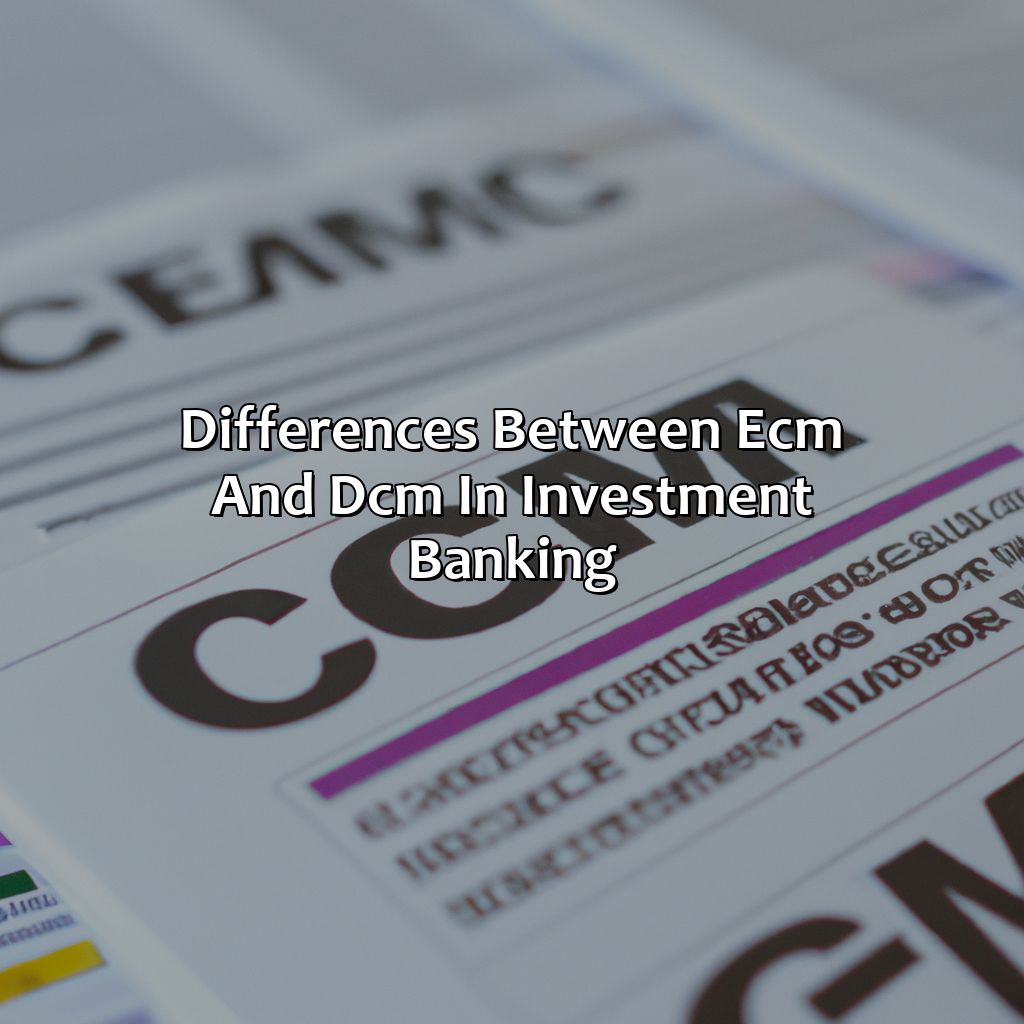
Image credits: retiregenz.com by Harry Jones
Five Facts About ECM (Equity Capital Markets) in Investment Banking:
- ✅ ECM involves raising capital for companies through the issuance and sale of equity securities. (Source: Investopedia)
- ✅ ECM is an important department within investment banks and is responsible for executing IPOs, follow-on offerings, and convertible bond offerings. (Source: Bloomberg)
- ✅ ECM teams work closely with corporate clients to determine the appropriate pricing, timing, and structure of securities offerings, and also assist with marketing and investor relations. (Source: Wall Street Oasis)
- ✅ The global ECM market saw a rebound in activity in the second half of 2020, largely driven by a surge in IPOs and SPAC offerings. (Source: EY)
- ✅ Key players in the ECM space include JPMorgan, Goldman Sachs, Morgan Stanley, and Bank of America Merrill Lynch. (Source: Financial Times)
FAQs about What Is Ecm In Investment Banking?
What is ECM in investment banking?
ECM stands for Equity Capital Markets, a division of investment banking that deals with the issuance and trading of stocks, shares and other equity securities. ECM involves assisting clients in raising funds from the public equity markets and advising on related strategic decisions.
What is the role of ECM in investment banking?
The role of ECM in investment banking is to help companies raise capital by issuing equity securities such as common stock, preferred stock and convertible securities. ECM teams advise clients on the most suitable equity funding options and construct investment strategies that can attract and retain institutional investors and individual shareholders.
What are the different types of ECM offerings?
The different types of ECM offerings include initial public offerings (IPOs), follow-on offerings, rights issues, private placements, block trades, convertible bond issuances, and exchangeable bond offerings. ECM professionals assess the risk profile of each option and develop a customized approach that fits the client’s requirements and market conditions.
What are the benefits of ECM for companies?
The benefits of ECM for companies include raising capital to fund growth and expansion, increasing liquidity of shares for existing shareholders, enhancing brand visibility and credibility among investors, and creating strategic alliances with investors who can add value to the business.
What are the challenges faced by ECM professionals?
ECM professionals face several challenges such as volatile market conditions, complex regulatory environments, intense competition, changing investor preferences, and technological disruptions. They must stay updated with the latest trends and issues affecting the market and have the ability to adapt quickly to changing circumstances.
What are the skills required to succeed in ECM in investment banking?
To succeed in the ECM division of investment banking, professionals must have strong analytical skills, strategic thinking, excellent communication and interpersonal skills, a deep understanding of the capital markets, and the ability to work in a fast-paced, high-pressure environment. They must also possess a strong work ethic, a commitment to teamwork and collaboration, and a willingness to learn and adapt to new challenges.
